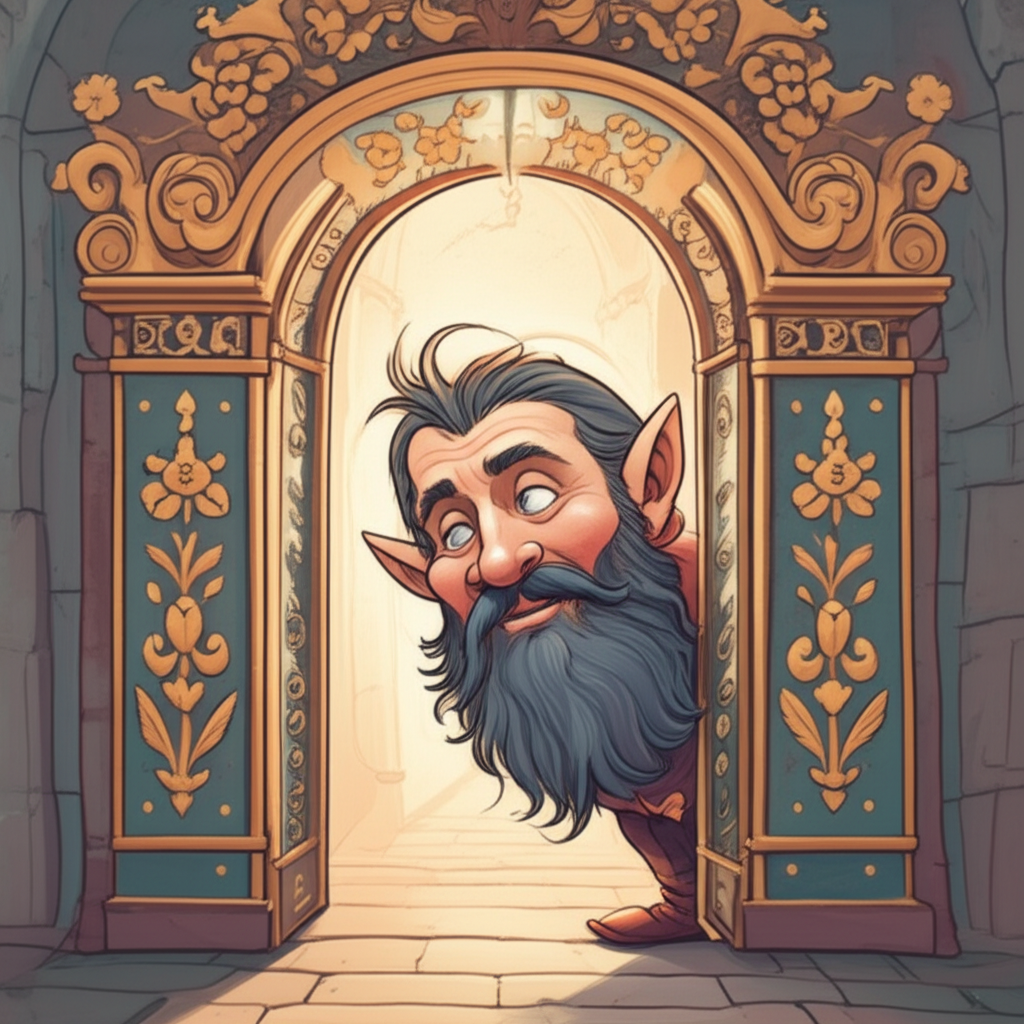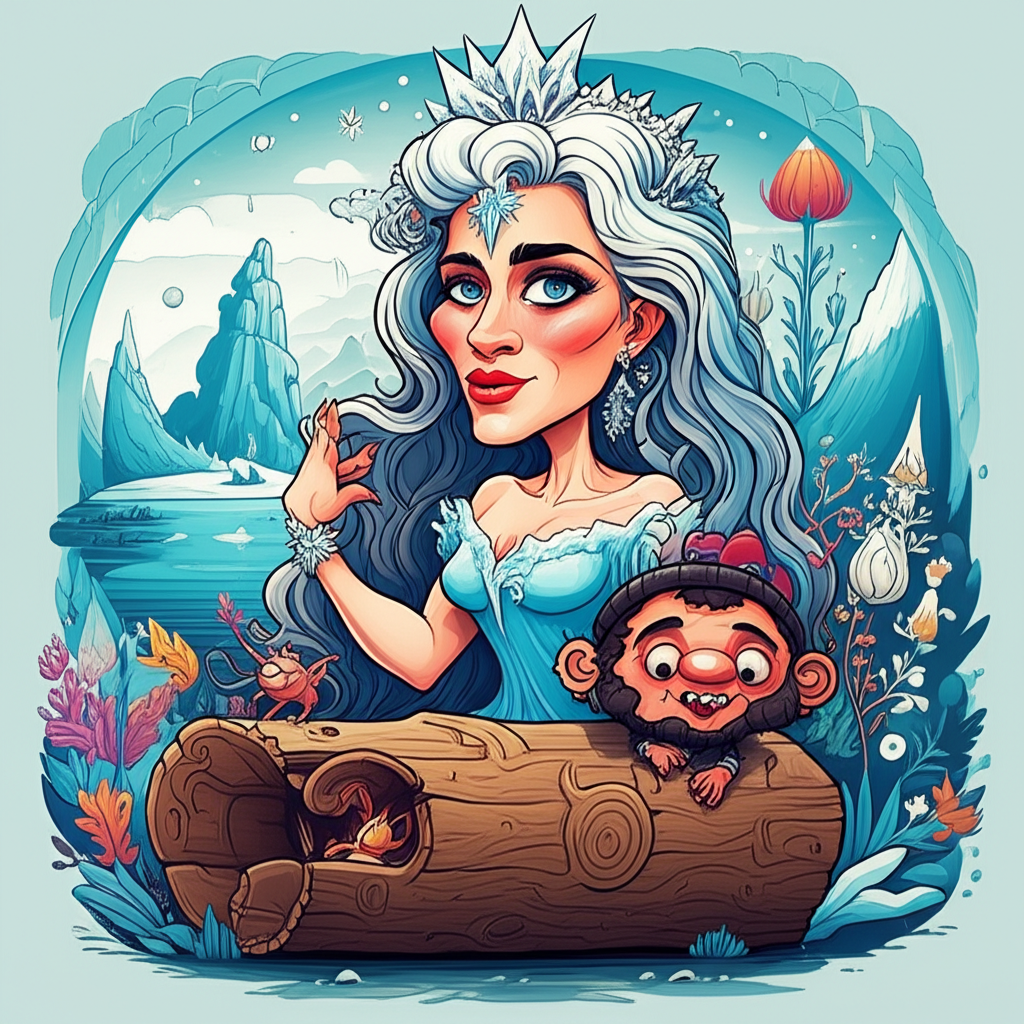
This article delves into the fascinating world of Slavic mythology, exploring a traditional narrative about a household spirit known as the Domovoi and a mythical concept, the Gate of Dawn. It is crucial to understand from the outset that this is a story, a legend woven by ancient people, and is not real. These tales were part of a rich oral tradition, offering explanations for the world around them and instilling moral lessons or cultural values, rather than being literal accounts of events or beings to be believed in, worshipped, or practiced. Our purpose here is purely for cultural, historical, and educational understanding.
Origins and Cultural Background: Echoes from an Agrarian Past
The myth of the Domovoi and similar household spirits finds its roots deep within pre-Christian Slavic societies, primarily spanning Eastern Europe and parts of Russia. This was a time when life was intrinsically linked to the land and the rhythms of nature. Villages were often isolated, and homes, typically constructed from wood and mud, were vital sanctuaries against harsh winters, wild forests, and unknown dangers.
In this agrarian world, people viewed their environment as alive, infused with unseen forces and spirits. Every stream, forest glade, and especially every home, was believed to have its own guardian or inhabitant. Their worldview was animistic, a belief system where inanimate objects, places, and creatures possess a distinct spiritual essence. The home, in particular, was not merely a structure but the heart of family life, a sacred space where generations lived, loved, and died. It was within this context of deep reverence for the hearth and the constant interaction with a seemingly living world that the legend of the Domovoi took shape. These beliefs provided a framework for understanding fortune and misfortune, offering a sense of order and a means of interacting with the unpredictable forces they perceived around them.
The Domovoi: Spirit of the Hearth
At the heart of many Slavic homes, both physically and spiritually, resided the Domovoi. This revered household spirit was typically described as a small, elderly man, often covered in fur, sometimes resembling the patriarch of the family. Other accounts depicted him as a shaggy, grey creature, or even as a miniature, invisible being. He was said to reside in the warmest parts of the house: behind the stove, under the threshold, or in the attic.
Symbolically, the Domovoi represented the very essence of the dwelling and the continuity of the family line. He was the unseen guardian of the home, the protector of the hearth, and the benevolent, albeit sometimes mischievous, keeper of domestic order. A well-respected Domovoi would ensure the family’s prosperity, protect livestock, prevent fires, and even warn of impending dangers. However, if neglected or disrespected, he could become a source of minor annoyances – misplaced items, strange noises, or bad luck. His presence underscored the ancient Slavic belief in the sanctity of the home and the importance of maintaining harmony within one’s living space. He was not a deity to be worshipped, but a powerful spirit to be acknowledged and appeased through small offerings, such as a bowl of milk or a piece of bread left by the stove, to ensure the well-being of the household.
The Main Story: The Domovoi and the Gate of Dawn
In the heart of an ancient Slavic village, nestled amidst rolling hills and dense forests, stood the humble wooden home of the Volkov family. For generations, a Domovoi named Zhivko had watched over their hearth, his unseen presence a comforting warmth in the long winters. Zhivko was old, his fur (if one could ever truly see it) was said to be the colour of ash, and his eyes, though rarely glimpsed, held the wisdom of centuries. He had seen countless sunrises paint the sky over the Volkov homestead, but none had ever felt as chilling as the one that now refused to break through the encroaching gloom.
A strange blight had begun to creep through the valley. It started subtly: a faint mildew on the stored grains, a sourness in the milk, a lingering chill that no fire could fully dispel. Soon, livestock grew sickly, crops withered prematurely, and a pervasive lethargy settled over the Volkov family. Old Katerina, the matriarch, felt her spirit dimming, and young Luka, usually full of boisterous energy, grew pale and quiet. Zhivko, from his hidden perch behind the great stone oven, felt the very life force of the home, its dom, begin to wane. The familiar hum of contentment was replaced by a hollow echo, and the warmth of the hearth flickered precariously.
This was no ordinary misfortune, Zhivko realized. An ancient, insidious shadow, born of forgotten neglect and the creeping despair of the land, was slowly suffocating the protective magic of the home. The blight was a symptom, not the cause. The true danger was the erosion of the sacred bond between the family and their dwelling, a bond that Zhivko had sworn to uphold. He knew what must be done. He had heard the whispers in the rustling leaves and the groaning timbers of the house – tales of the Gate of Dawn.
The Gate of Dawn was not a physical gate of wood or stone, but a mythical threshold, a sacred place where the first, untainted light of creation touched the earth. It was said to be a source of primal protective energy, a place where the world renewed its ancient wards against the deepest shadows. Only at the precise moment of the deepest night, just before the first glimmer of the true dawn, could one access its power. And only a spirit deeply attuned to the heartbeat of a home, like a Domovoi, could hope to harness its essence.
Under the cloak of the deepest night, Zhivko, an imperceptible shimmer in the air, slipped out of the Volkov home. The journey was arduous for a spirit whose very being was tied to a single dwelling. He navigated through the moonless forest, its ancient trees twisted into grotesque forms by the encroaching shadow. He sensed the malevolence growing, a cold tendril reaching towards the village. The air grew heavy, and strange whispers seemed to follow him, trying to deter his purpose.
His path led him to the highest peak overlooking the valley, a desolate, windswept crag known only in hushed legends. As he ascended, the world around him seemed to hold its breath. The stars above were veiled, and the air crackled with a silent tension. At the very summit, as the darkest hour before dawn enveloped the land, Zhivko perceived it: not a physical gate, but a swirling vortex of pure, nascent light, a shimmering portal to the very essence of daybreak. This was the Gate of Dawn.
Gathering his ancient strength, Zhivko projected his being towards the swirling light. He poured his essence, his millennia of dedication to the hearth, into the nascent dawn. He felt the cold touch of the encroaching shadow trying to pull him back, to sever his connection, but his resolve was unbreakable. He was the guardian, the spirit of the dom, and he would not fail. He reached deep within the swirling light, grasping not an object, but a feeling, a surge of pure, protective energy – the revitalizing essence of the true dawn. He absorbed it, letting its warmth infuse his very being.
As the first faint streaks of colour began to bleed across the eastern horizon, Zhivko, renewed and strengthened, returned to the Volkov home. He moved through the sleeping house, a beacon of warmth, and deposited the essence of the Gate of Dawn into the very stones of the hearth. A soft, golden glow emanated from the oven, spreading outwards, chasing away the lingering chill and the insidious shadow.
By morning, the blight began to recede. The grains in the larder seemed fresher, the milk sweeter, and Katerina awoke with a lightness in her heart she hadn’t felt in weeks. Luka, his cheeks regaining their colour, bounced out of bed, ready for the day. The Volkov home, once again, pulsed with the warmth and life that Zhivko had so fiercely protected. The family never knew of his perilous journey, but they felt the renewed warmth, the unspoken comfort, and offered a fresh bowl of milk by the stove, a silent tribute to the unseen guardian of their home.
Symbolism and Meaning: A Tapestry of Ancient Beliefs
This narrative, like many folk tales, is rich with symbolism. The Domovoi himself embodies the profound importance of the home as a sanctuary and the family as the bedrock of society. He represents security, continuity, and the unseen forces that people believed contributed to or detracted from their daily well-being. The blight and the encroaching shadow symbolize not only physical ailments but also the deeper fears of ancient communities: famine, disease, spiritual corruption, and the dissolution of family bonds.
The Gate of Dawn is a powerful symbol of hope, renewal, and the cyclical triumph of light over darkness. It represents a fundamental truth in many cultures: that even in the deepest despair, a new beginning is possible. For the ancient Slavs, it would have signified the enduring power of creation, the source of life-giving energy, and the constant battle against perceived malevolent forces. The Domovoi’s journey to this mythical gate underscores the idea that even the most grounded and domestic spirits might need to draw upon cosmic forces to protect their charges, highlighting the interconnectedness of their world – from the smallest hearth to the vast, celestial expanse. It also speaks to the profound dedication and responsibility associated with guardianship, whether of a home, a family, or a community.
Modern Perspective: Echoes in Contemporary Culture
While the Domovoi and the Gate of Dawn are no longer subjects of literal belief, their stories continue to resonate in the modern world. In literature, folklore, and fantasy genres, the Domovoi often appears as a benevolent, sometimes grumpy, helper, a creature that grounds magical narratives in the mundane. He features in children’s books, animated films, and video games, often anthropomorphized for a wider audience, but always retaining his core identity as a protector of the home.
Culturally, the tales of the Domovoi are studied in anthropology and ethnography, offering invaluable insights into the animistic belief systems of ancient Slavic peoples. They help us understand how these communities explained phenomena, dealt with anxieties, and reinforced social structures. The enduring concept of a "cozy home," a cherished and protected space, subtly echoes the ancient reverence for the hearth that the Domovoi personified. These myths remind us of humanity’s universal need for security, belonging, and a sense of guardianship over our personal spaces, even in a world vastly different from that of their origin.
Conclusion: A Legacy of Imagination
The tale of the Domovoi and his journey to the Gate of Dawn serves as a beautiful example of the rich tapestry of human imagination and the enduring power of storytelling. It is a cultural artifact, a whisper from the past, offering a glimpse into the worldview of ancient Slavic peoples. It is important to reiterate that these stories are part of a cultural heritage, not a call to belief or practice. As Muslims, we recognize that Allah (SWT) alone is the true Creator and Sustainer of all existence, and only He possesses true power and wisdom.
Nevertheless, these narratives, like many others from diverse cultures, enrich our understanding of human history, creativity, and the varied ways in which people have sought to comprehend their world. They remind us of the universal human desire to find meaning, to protect what we cherish, and to weave narratives that explain the inexplicable, connecting us across centuries through the enduring magic of imagination and the timeless tradition of sharing stories.



